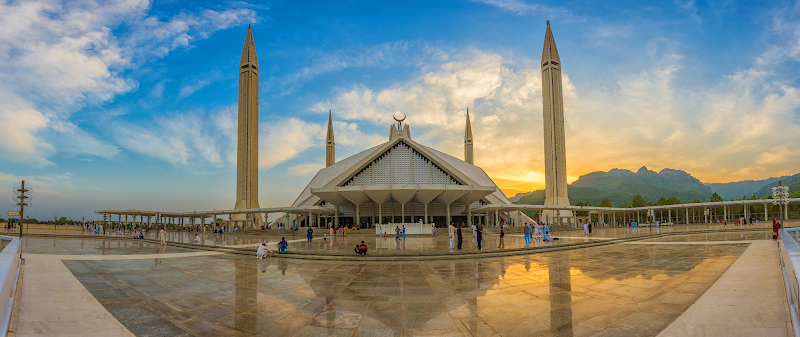 The iconic Faisal Mosque in Islamabad, Pakistan (Photo from Wikimedia Commons)
The iconic Faisal Mosque in Islamabad, Pakistan (Photo from Wikimedia Commons)
The Colombo Plan Staff College (CPSC) wishes to extend its full cooperation in the celebration and commemoration of the Islamic Republic of Pakistan on its 77th Independence Day this August 14, 2023. May we all embrace the spirit of nationhood so that we can all work together towards the path to economic and social development.
History
 Photo of Pakistanis hoisting their flag during their independence (Photo from Dunya Blog)
Photo of Pakistanis hoisting their flag during their independence (Photo from Dunya Blog)
Pakistani society is largely hierarchical, with high regard for traditional Islamic values, although urban families have grown into a nuclear family system because of the socio-economic constraints imposed by the traditional joint family system.
The variety of Pakistani music ranges from diverse provincial folk music and traditional styles such as Qawwali and Ghazal Gayaki to modern forms fusing traditional and western music, such as the synchronization of Qawwali and western music by the world renowned Nusrat Fateh Ali Khan. In addition Pakistan is home to many famous folk singers such as the late Alam Lohar, who is also well known in Indian Punjab. However, the majority of Pakistanis listen to Indian music produced by Bollywood and other Indian film industries.
State-owned Pakistan Television Corporation (PTV) and Pakistan Broadcasting Corporation were the dominant media outlets, but there are now numerous private television channels. Various American, European, and Asian television channels and films are available to the majority of the Pakistani population via private television networks, cable, and satellite television (43 million Pakistanis have satellite television). There are also small indigenous film industries based in Lahore and Peshawar (often referred to as Lollywood). And while Bollywood films have been banned from being played in public cinemas since 1965 they have remained in popular culture.
Celebrations
 Photo of Pakistani children during their independence day celebration (Photo from AstroSage)
Photo of Pakistani children during their independence day celebration (Photo from AstroSage)
Pakistan Independence Day on August 14 could be considered a double day of liberation. Muslim Indians also fought to be free of British rule and later re-armed to battle for their own nation-state, present day Pakistan — once part of the Indian subcontinent. After the British put down the Indian Rebellion of 1857, the Crown assumed full control during the British Raj period. This lasted until Pakistan’s independence in 1947. The Mountbatten Plan split Pakistan (comprising West and East Pakistan) from India, creating an independent Muslim nation. In 1971, East Pakistan gained its own independence, becoming known as Bangladesh. Today, West Pakistan is known simply as Pakistan.
The main Independence Day ceremony ceremony is organized in Islamabad, where the national flag is hoisted at the Parliament and Presidency buildings. This is followed by the national anthem and widely circulated and televised speeches by the President and Prime Minister of Pakistan.
Sources
- A Short History of Pakistan. http://blogs.dunyanews.tv/26560/
- Pakistan Independence Day https://nationaltoday.com/pakistan-independence-day/






